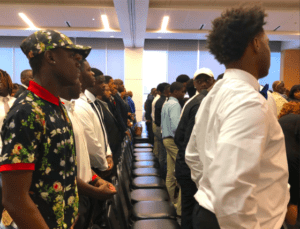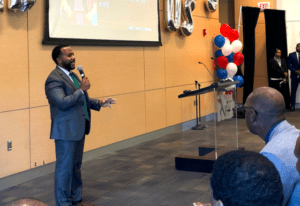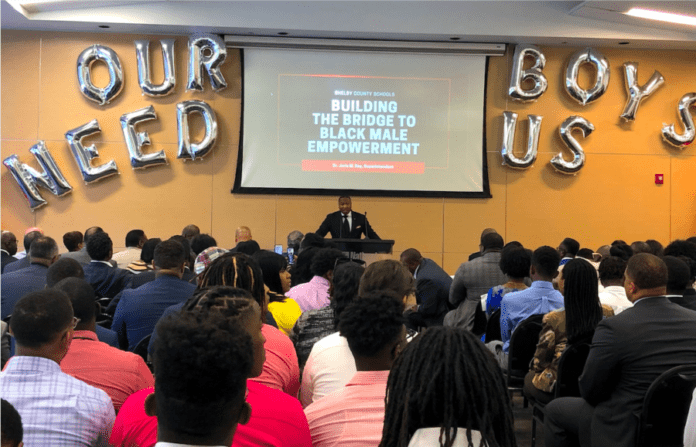Superintendent Joris Ray launched a new initiative Monday that he hopes will help black boys improve their test scores, take more advanced courses, and be on the receiving end of school discipline less often.

Black boys make up about 38% of Shelby County Schools students, but bear the brunt of all the negative statistics Ray presented to a crowd of about 200 people Monday who were at the kickoff of the African-American Male Empowerment initiative.
“Our African-American males have been overwhelmingly identified as the foremost vulnerable and challenged population in our system,” he said. “In Shelby County Schools, we cannot and will not allow African-American males to languish in the midst of antiquated systemic practices that do not take into account the very real challenges that deeply and directly affect them every day.”
Ray led a short ceremonial march to the National Civil Rights Museum with city leaders and about 100 black male students before announcing the initiative. The museum was formerly the Lorraine Motel, the site where civil rights leader Martin Luther King Jr. was assassinated in 1968.
The museum’s event room had the initiative’s slogan “Our Boys Need Us” in large balloons and echoed “Glory,” the banner song of the 2014 movie “Selma” that chronicled voting rights marches in Alabama in the 1960s.

Memphis leaders who attended included Floyd Bonner, the county’s first elected black sheriff, County Mayor Lee Harris, University of Memphis basketball coach Penny Hardaway, and Police Director Michael Rallings — all black men. Ray announced that Michael Lowe, a former teacher, principal, and principal coach, will lead the district’s new equity office to carry out the initiative. It will also take on other initiatives, with this one being the largest. The coming school year will be a planning year.
“This is not going to be done overnight. It’s taken years to get this way. It’s going to take us some time to get out of it,” Lowe told the crowd. “But thoroughly and surely we’re going to make our way through.”
The statistic that most concerned Shaun Odum, a rising senior at Raleigh-Egypt High School, was the low number of black boys taking Advanced Placement classes for college credit.
“If they were pushed to be in the AP classes, they would do good in them. They would succeed,” he said.

Daniel Gwin, a rising junior at White Station High School, was just glad someone was taking notice.
“I didn’t know anyone cared,” about black boys’ experiences, he said. “It’s good, but we’re not really going to feel the effects of it. We’re going to be graduated by then. But it’s good to know somebody cares because my little brothers will grow up in a good school district.”
Some of the statistics district leaders cited included comparisons with other ethnicities and girls. Others compared black boys to the district average. Shelby County Schools did not provide complete demographic breakdowns to Chalkbeat. Below are Ray’s priorities in bold:
- Ensure access and exposure to rigorous instruction. The district said black boys are half as likely than the district overall to be enrolled in the gifted students program, CLUE, a statistic that mirrors national trends. According to a 2016 study at Vanderbilt University, black students are far less likely to be placed in gifted programs, even if they have the same test scores as their white peers, and especially if their teachers are white.
- Intensify restorative practices. Black boys are 50% more likely than the district overall to be suspended or expelled from school, according to the district’s report. That means students miss more instruction time and could fall behind in schoolwork. The district has hired more counselors and behavior specialists in recent years to help get to the root cause of misbehavior and this fall will launch “reset rooms,” where students can talk through problems before officials resort to out-of-school suspensions or expulsions.
- Recruit African-American male teachers in K-5. About 740 black men teach in Shelby County Schools, making up about 12% of the teaching workforce, Lowe said. That’s six times more than the national average, but district leaders said more are needed. A 2017 study showed that black boys in Tennessee and North Carolina were 39% less likely to drop out of high school if they had just one black teacher in the third, fourth or fifth grades. But often, black men say they are relegated to handling discipline issues rather than teaching. In Tennessee, black teachers, especially males, are transferring to other schools within the same district at a higher rate than white teachers.
- Build “Band of Brothers” to support mentoring and tutoring programs. Each Memphis zip code will have a coalition of community leaders and principals to recruit and match mentors with black boys. “It starts with somebody planting that seed and believing in them and speaking life to them,” Ray said.
- Create an Equity Institute for professional learning. “We’ve got to work with our principals and teachers,” Ray said on reducing implicit bias against black boys. “It’s how we respond to these young men — not trying to change them.” The district has recently hosted administrator trainings to meet the needs of black boys.
- Leverage an Equity Task Force. The task force is expected to be made up of city and community leaders. The group will make recommendations and work with district officials to provide support outside the classroom.
- Establish an Equity Office. The idea was modeled after Oakland’s in California, and with input from similar efforts in Chicago and Charlotte. Ray and Lowe have visited several cities recently to meet with school officials there. The office will produce policy recommendations, craft the black male teacher recruitment strategy, and also lead any efforts to address “all inequalities throughout our school district,” Ray said.
The district is already addressing some of the inequities seen in admitting black students to gifted programs and advanced classes. Earlier this year, the district announced it would screen all first-grade students for its gifted program, rather than rely on teacher or parent recommendations. The district is also aiming to have at least two honors and college credit classes in every high school by fall 2020 — courses that have recently been scarce in schools with more students living in poverty.

Ray said goals for the initiative are still being formed and that he would host another event in a year to share progress toward those goals.
Gwin, the White Station High student, said he thinks more black male teachers will have the most impact.
“I had a black [male] teacher once. He was cool,” said. His friend sitting next to him said he never did. “He was someone I could see myself trying to be like.”
Kevin Woods, the lone black man on the district’s school board, agreed.
“Throughout my K-12 experience, I had several African-American male teachers,” said Woods, who graduated from high school in Bolivar. “Seeing role models that look like the student population… had a positive impact on [imagining] what was possible.”



